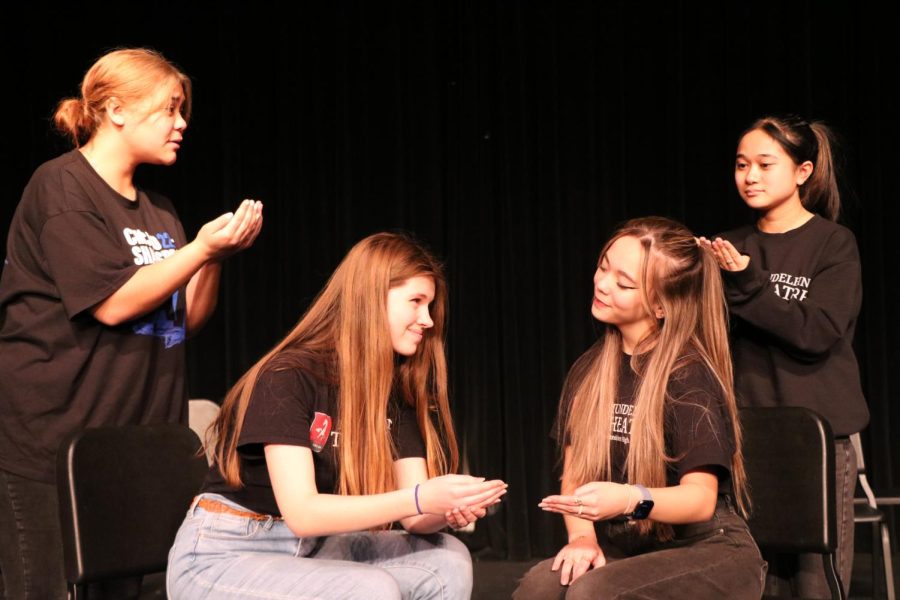Mundelein Theatre shakes up finals
From left to right: Adriyanna Tesimu, junior; Zoë Van Krey, junior; Sydney Olorvida, sophomore; and Stephanie Aquino, junior; perform the dream round scene of their performance. During this, the team mixed the given text of “Richard III” with the musical “She Loves Me” to portray the story of “Richard III” in a unique way.
February 8, 2023
“An honest tale speeds best, being plainly told.” Act four, scene four of “Richard III,” the selected text performed by Mundelein Theatre’s Shakespeare Slam team– and other surrounding high school’s– at this year’s Shakespeare Slam competition.
“Shakespeare Slam is a quasi-competitive program where schools from the Chicagoland area study a Shakespearean text, attend workshops, and ultimately perform two five minute scenes during a regional [bout] and final bout,” Co-Director and Team Coach Mark Landuyt said.
The two performances consist of the scene round and the dream round.
“We select a scene from the play and cut it down to a maximum of five minutes. It’s just a scene straight from the play, just with a fraction of the lines,” Senior Madeline Demuth said. “For the dream round, we take the lines from the year’s selected text and mix them around to create a completely different scene that is truly our own, and just like the [scene round] it has to be under five minutes long.”
In the dream round, teams are also allowed to use an additional, non-Shakespearean source to tell the play in a creative way. This year’s Slam team used songs from the musical “She Loves Me” to make their dream round scene like a mini “rom-com.”
From there, the scores from both scenes are tallied to determine “three teams from each regional bout to perform at the final bout,” stated Landuyt.
After each team performs and gets feedback from judges, those top three teams are announced to compete at finals. Mundelein was one of them.
“I was elated when we made finals,” Demuth said. “I have been participating in Slam for all three years, but my first two years were virtual non-competitive presentations (because of Covid). Finally being able to perform our scenes in front of an audience was an amazing experience, and making it to finals made it that much better.”
According to Theatre Director Jonathan Meier, Slam has had a “great deal of success” at these competitions in the past. With that, it’s always “very gratifying to be recognized.”
“[The most exciting part is that] making the finals means that our students get to perform on the Chicago Shakespeare stage,” Meier said. “It is one of the coolest theater venues in the world.”
To get there, those in Slam had to work hard from the very beginning– starting with rehearsals that began in July.
“It’s such a long development period, [so] the team gets particularly close,” Meier said. “This is probably the most collaborative show that we do each year.”
To create their two scenes, all team members get to have a say in every aspect of the production– scene selection, casting, development and performance.
“It is a phenomenally creative process, one that each team member has input and agency,” Meier stated.
Yet, Slam encountered some challenges throughout their season. Landuyt noted how their schedule was a challenge..
“We rehearse three hours per week and don’t start until 6 p.m. or later,” Landuyt said. “That is a lot to ask any student, let alone these kids that are often involved in other extracurriculars on top of Slam. It is a labor of love.”
Being able to understand Shakespeare is also another obstacle the team had to overcome.
“We have to fully understand the text ourselves to be able to communicate it to the audience in a way they can understand, even if they know nothing about Shakespeare,” Demuth said.
Although working with Shakespeare text can be a challenge, it is the best part according to Meier.
“High school students can understand Shakespeare and make it come to life. We study the language, rhythm, thematic elements and structure,” Meier said. “We geek out on the Shakespeare, and it is fantastic!”


Madeline Demuth • Feb 9, 2023 at 8:55 am
Slay Megan! That’s a cool article!